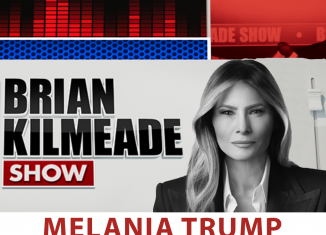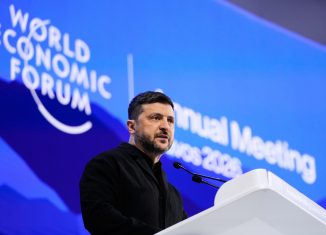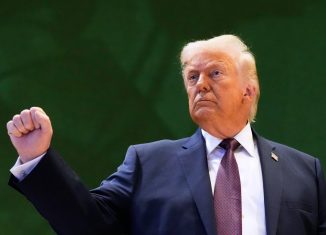Senate Majority Leader John Thune (R-SD) spoke to Brian Kilmeade about Senator Schumer and the Democrats pushing back on DOGE. Thune says this is an act of desperation by Democrats because they never want to cut a penny out of any government program and are unwilling to do what is needed for the government to run more efficiently. Thune agrees with Elon Musk that if the budget crisis isn’t fixed there will not be money for Medicare and Social Security. Thune believes in how DOGE is looking into waste, fraud and abuse and the need for new eyes to bring a fresh perspective willing to modernize how government operates, instead of the antiquated systems that have been built on bureaucracy and red tape.
Brian asked Thune about being caught off guard with President Trump’s Truth Social post on passing a single big bill and Thune explained he was using the line from Anchor Man, ‘Did not see that one coming’. However, Thune said President Trump has always favored one big beautiful bill and thinks it can get done. Thune pointed out that the one thing not included in the single House bill is making tax cuts permanent. Thune said if the House bill comes before the Senate without making tax cuts permanent, then the bill will have to be modified by the Senate. Thune added, if the House can get everything done in one bill then “More power to them, we will work with them to get all the pieces of a reconciliation bill across the finish line.” In the meantime, Thune says they will do their part to give the president the option of a bill in the Senate that addresses the most important issues the President wants, national security, border security and energy development.
Thune also discussed the Democrats delaying confirming President Trump’s nominees. Thune said the democrats are using every tactic they can to prevent President Trump from getting his people in place. Thune believes the Democrats have so much Trump Derangement Syndrome, they can’t see straight.
On the rhetoric between President Trump and Ukraine President Volodymyr Zelenskyy, Thune said Putin and Russia are very clearly the aggressor in this conflict but this is a process and we have to be patient. Thune thinks everybody needs to take a deep breath and he knows that President Trump wants peace in Ukraine and his administration is working hard to accomplish that goal.
Listen here:
Rough transcript below
Speaker 1 [00:00:00] Everyone knows there’s waste in government and should be cut. But those is using a meat ax and they’re cutting things that are efficient and effective. If you want to make cuts, then you do it through a debate in Congress, not lawless, by just implementing them flawlessly.
Brian Kilmeade [00:00:18] Well that’s interesting. Term. Turn of phrase. Senate Majority Leader John Thune joins us now. That was the minority leader in the Senate. Senator Thune, welcome back.
Sen Thune [00:00:28] Good to be with you, Brian. Thanks.
Brian Kilmeade [00:00:30] Did you hear us? Senator Schumer says flawlessly. DOJ’s cutting thing from the budget flawlessly.
Sen Thune [00:00:36] Yeah, they they are, they’re grasping right now. Let’s put it that way. This is, sort of a, you know, an act of desperation on but on the part of the Democrats who have never been willing to cut a penny out of any government program and, in every budget fight are always trying to spend more and more and more. So it’s not surprising that they are reacting this way. It is a, I think, fairly predictable but unfortunate again that the, the Democrats seem unwilling to allow any, review or scrutiny, of government programs that could be run a lot more efficiently. And I think that’s what this is all about.
Brian Kilmeade [00:01:14] Do you agree with this cut for.
Speaker 4 [00:01:17] I really want to emphasize to people that this is a very important point. If we don’t solve the deficit, there won’t be money for medical care. They won’t be money for Social Security. We either solve the deficit or all they’ll be doing is paying debt. No, but it’s a it’s got to be solved or there’s no medical care. There’s no social security, no nothing that’s got to be solved. It’s not optional. America will go bankrupt if this is not done. That’s why I’m here.
Brian Kilmeade [00:01:40] Do you see it that way?
Sen Thune [00:01:42] Well, I think it’s. You know, the question is how soon that happens. But yeah, it’s inevitable. That is the the track that we are on. And, we’ve got to change that trajectory, Brian, because, if you continue to spend more and more to finance the debt and now we, we spend more on interest on the debt than we do on national security, on defense, if you can imagine that. So he’s right. It’s a matter of time. And we’ve got to start bending the spending curve in the right direction. And we start doing that. We get good growth in the economy. We can get back on a more sustainable fiscal path. But at the moment, there is no question that unless we’re willing to make some hard decisions that have been postponed and put off for way too long, we are headed. You know, it’s a, there is a dead end we’re headed into and not good for the country. And so that’s why this exercise is necessary.
Brian Kilmeade [00:02:33] Sara, do you have any problem with the way they’re approaching things so far, being that so much of this is unprecedented?
Sen Thune [00:02:39] No, I mean, I think that, you know, there’s a lot of, obviously from the Democrats in particular and some in the media, the criticism of, you know, the who’s who’s in charge of all this. But, you know, honestly, in some ways, I think you need people from the outside who have expertise in this field because the, you know, the government is in many ways just incredibly antiquated. The systems that are used, the bureaucracy built upon bureaucracy, the red tape, the silos in which things are done instead of creating and, you know, an integrated, efficient, taxpayer friendly and, and technology driven, you know, government instead of this, this old paper driven, bureaucracy that’s existed for years and years and decades and decades. So, you know, in a lot of ways, it’d be great if, if, you know, you could fix it from within. But I think, frankly, you need some some eyes that bring fresh perspective and are willing to, take on some of the stereotypes that, you know, have existed for way too long.
Brian Kilmeade [00:03:40] So far with every nominee that President Trump has put forward, they’ve gotten through. Matt Gates was withdrawn after a couple of weeks. I never thought that was serious. Anyway, but when everyone got through and Cash Patel is on deck right now, if you look at where the other presidents were at this point in 2009, Obama pretty impressive. 17 in 2017, Trump had 14. In 2021, Biden had seven. And now you have shepherded 18 through. And now today, Kash Patel could be 19, correct?
Sen Thune [00:04:11] Right. Kash will be 19. And we’ll do we’ll get that one done this afternoon. And then of course, we’ve got Linda McMahon teed up. Obviously. Next. And then we’ve got, James Greer, who’s the U.S. trade rep, is also a 30 hour. And you know, and remember, Brian, the thing about this is the Democrats aren’t playing ball on any of this. I mean, they are blocking, delaying, using every dilatory tactic that they can try and prevent the President Trump from getting his people in place. So we’re having to work around that. And I think we have effectively done that to the point that we are ahead a pace relative to anything we’ve seen going back to about 2001. But you just have to grind them down. And, you know, it’s unfortunate that that’s what it takes, but that’s the kind of political environment we’re in right now. And, these Democrats have so much, Trump Derangement Syndrome that they can’t see straight. And, you know, you hear that rhetoric on the floor every day. And, anyway, it’s a, it is a process, but we’re going to keep at it. And there’s, you know, a lot more we have a lot more we have to get done and a lot more nominees we need.
Brian Kilmeade [00:05:12] To get through. Well, yeah, I mean, it’s a heck of a pace. You guys stayed a couple of weekends. That certainly makes a difference. You can’t get anything done if you don’t have a team in place. And even though Trump likes to put his hands on things, he’s got to have cabinet secretaries working in that direction. Now you got to get ambassador seated. Like, for example, in Israel, that’s not a ceremonial position. That that matters a lot. Correct.
Sen Thune [00:05:33] That is and Mike Huckabee is a great nominee for that position. In fact, he’s the perfect nomination nominee for, ambassador to Israel. Of course, the ambassador of China, also a critically important one right now, given what’s going on in the world. So those are all teed up. And, you know, the thing is, I guess, Brian, you know, I think maybe a lot of people don’t realize this, but the Senate, by virtue of the Constitution, article one with advice and consent, we literally spent two thirds of our time on personnel. I mean, we have to do not only all the judges, all the judiciary comes through the Senate for confirmation. The federal judiciary. But you also have 1100 executive branch nominees, positions that are subject to Senate confirmation, meaning that we have to do 1100 of these. And unfortunately, what happens too often and I you know, you the administration gets to office and some of their people don’t get in place until the third year of their four year term, which is ridiculous. So I’m a big believer that we’ve got to figure out how to streamline and expedite that process. But in the meantime, we’re going to do everything we can the old fashioned way to just keep putting them, putting them through and getting them in their positions so they can implement the president’s agenda.
Brian Kilmeade [00:06:39] If you don’t mind, take a step back. Fundamentally, you’re looking at a big debate between the House and Senate, both Republican majorities. This the House Speaker Johnson’s been insistent. I need one bill. If I have to break up this thing into two bills. I’ll never get my whole caucus together. And you went ahead and, Sarah Lindsey Graham also, right by your side and said, I’m doing two bills, and now there’s going to be a vote. Arama, I think today where people can put amendments to one bill. What would that one bill consist of and what would the second bill consist of? And why not just do one?
Sen Thune [00:07:13] Well, I think we’re and I’m game. And if the House can execute on getting one done more power to them. I think at the moment what we’re trying to do is preserve optionality for the president. The president is, you know, campaigned on and said his number one priority is securing the border. And this this bill that we’re doing today is heavily focused on giving the president the resources he needs to secure the border. It’s also, helps rebuild our military, which is something that, you know, desperately, we are have fallen farther and farther behind in terms of making sure that in a dangerous world, our men and women in uniform have the weaponry, the technology, the training, to do the job that we asked them to do. And then it’s focused on energy and in restoring energy dominance for this country. So there are three priorities addressed in this bill. We know the tax piece has to be done, but we also have till the end of the year to do that. The current tax law doesn’t expire until December 31st of this year. And that’s going to take a little while longer. But we’re on the same track. And I tell people, you know, we have a bicameral system in this country. We have a House and a Senate. They’re structured differently procedurally. They operate and function very differently. But we’re headed the same goal. And so we’ll get there. You know, I’m hopeful. I tell people I’m encouraging and supportive of everything the house is able to do, but we want to, in the Senate, do our part to and make sure that we’re prepared to address what I think are the the really urgent needs right now, starting with border security, which, again, is the president’s number one campaign.
Brian Kilmeade [00:08:39] Promise. So yesterday it came out put on Truth Social. The president Trump said, hey, you know what I want one bill. Lindsey Graham, said the House approach was preferable, because it implements my full agenda. He said instead of Lindsey Graham’s approach, everything, not just part of it. He said he wanted all of his legislative priorities advancing a single big bill. You came back and said, well, that could be. That caught me by surprise. So in what way did it catch you by surprise, you said. I didn’t see that one coming.
Sen Thune [00:09:09] Well, that’s the, the anchor man line. I did not see that one coming, but I think the. Yeah. I mean, the president obviously has weighed in at different times in many cases. He does that in our in our in the context of meetings with him that happen, you know, in a more private setting. He actually went out and said something publicly yesterday. But what I can tell you, Brian, is that we coordinate closely with him and his team. And, you know, JD Vance, the vice president, was up here at our lunch yesterday, took a bunch of questions on this subject. And what’s clear, to me at least, is the, again, that the I believe the president, although he’s always said he favors one big beautiful bill, which is fine. We can get that done. More power to him. But I think that the, the one thing that doesn’t include it isn’t included in the House bill, obviously. And that’s permanency for the tax, pieces. And that’s one of the things the president wants. And so there, you know, that bill is going to have to be changed or modified if it comes out of the house, you know, when it comes over here to the Senate to. So I guess what I’m saying is this is a process. It’s a long process. And I think the president and his team, as we have had conversations with them about this subject for some time now, realize what the margin in the House, you know, the challenges that they’re going to have in getting this done. If they can great more power to them. We will work with them to get the all the pieces of a reconciliation bill across the finish line. But in the meantime, the Senate were able to and, we’re here today and we’re prepared to execute on addressing those three immediate needs that I mentioned earlier. And, and I believe that preserves optionality for the president. It always also encourages the House to move. I think it creates forward momentum. And so we want to do our part and be good partners in getting, as I said, all of this across the finish line. So the president has what he needs to get the job done for the American people.
Brian Kilmeade [00:10:58] Right. So right now you and Speaker Johnson are speaking.
Sen Thune [00:11:01] Oh, yeah. Yeah. I mean, we communicate regularly and, you know, every day, almost every day Anyway.
Brian Kilmeade [00:11:06] Yesterday, you, it’s clear the president, United States was really ticked off that, Vladimir Zelensky said this after he met with, Russian delegation cut 15. Unfortunately.
Sen Thune [00:11:19] President Trump, with great respect for him as a leader of the people, which we respect very much, the American people who constantly support us, unfortunately, lives in this disinformation space.
Brian Kilmeade [00:11:29] So he feels like President Trump’s in the disinformation space. That is not something that’s going to win the president over. He blasted Zelensky, says he’s got low approval rating, has to have elections. And is he’s a bad leader. So obviously this reminds me very simple, very similar to the campaign even when he’s going against Republicans. Your thoughts about where we stand right now in the Ukraine or Russia war?
Sen Thune [00:11:54] Well, I think everybody and President Zelenskyy certainly, you know, everybody needs to take a deep breath. And I know that the President Trump wants peace in Ukraine will do, you know, next week marks three years of this horrific, horrific, war beginning, and the administration is working hard to end it. And as we’ve seen in the past, the president has been instrumental in getting our European allies to contribute more to defense spending. He’s been working with both Ukraine and Russia to end this horrible war. And I think you’ve got to give him some space to do that. You know, again, the rhetoric has been a little hot, but I don’t I think at the moment at least, let’s see how this where this lands. But wouldn’t it be great if we could, you know, find a finally get to a peaceful resolution here. And I think that’s what everybody wants to see happen. But it’s going to, you know, it is again, it’s a process. It takes a little bit of time. And so we just got to be kind of patient.
Brian Kilmeade [00:12:50] But there’s a there’s a faction within the Republican Party, that does not want to finance its war anymore. And you know, it, I believe that the Ukraine are the good guys in this. If they had their druthers, they would just be a westernized, nation prospering the best they can with an imperfect democracy. It’s Russia that is the problem. But what do you do with people in your own party? That said, I’m done with this?
Sen Thune [00:13:15] Well, I mean, I think there’s a there’s that strong sentiment out there. And of course, I hear it. And, and I think that, frankly, I don’t there’s any question about this. Putin and Russia are very clearly the aggressor in this conflict. There’s that’s a that’s just a fact. But I also think that, at the end of the day, the U.S. support and assistance, much of which help rebuild our own industrial base here, our military industrial base, because a lot of the weaponry that we sell to or, support the, Ukrainians with is, you know, creating jobs in this country, too. But it also, I think, is probably, limited in in the end. I mean, there’s a there’s a place in, in, where, American support and the support of the American people is limited. And so that’s why I think it’s important that they try and wind this down, figure out a way, to achieve an outcome that, you know, retains Ukraine’s sovereignty. And, and hopefully, puts them and our European allies in the region in a better position relative to, the aggressive posture that Russians take. And I think that’s what we all want to achieve there.
Brian Kilmeade [00:14:25] So Rahm Emanuel teeing off on Trump for saying essentially that it that Putin has all the cards cut 27.
Speaker 5 [00:14:32] We need a chance. Russia’s always wanting to negotiate with the United States. That gives them their superstar superpower status. That was their objective, one of the strategic objectives. We did a China deal, quote unquote. There was no increase in a single soil being China. But and Trump called it the greatest trade deal. Kim got no military exercise in the United States, in the Republic of Korea for nothing. Yeah. And, is the worst negotiator because it’s only goal is vanity.
Brian Kilmeade [00:15:01] Your reaction to that?
Sen Thune [00:15:02] Well, I think that, I disagree with that, obviously, but I just think that at the end of the day, what the president is always trying to achieve is, is a result is an outcome. And, he has a capacity, I think. And you got to let him use it, to make deals and, to find areas of agreement where others have tried and failed. And in this circumstance, at least, I think this is where, this is a three year war which nobody’s been able to resolve. It’s a puzzle that’s, been very complicated. And I think you going to have to have all the actors at the table to get it resolved. In the end. You have.
Brian Kilmeade [00:15:38] A vote. Yeah, you have a vote today. Just two. Oh, just to close this out. And it is it this is this a backup plan? Is is this one of two bills, a backup plan if the house doesn’t get it across the finish line?
Sen Thune [00:15:49] Well, it is. I don’t like to refer to it as a backup plan, but it’s an option. And I as I said earlier, I think it preserves optionality for the president and addresses, some of his most immediate concerns. And we had Tom home. And Russ will come up and speak to the Republican senators last week and say, we have got to have if we’re going to do the job securing the border, we’ve got to have. What you’ve included in this bill. So we think that it addresses an immediate need. The other pieces of this are going to come and will come later, whether that comes in the version of the House passed resolution sometime next week or in the weeks, subsequent to that, one way or the other. In the end, we’ll get these, merged up and put something on the president’s desk that hopefully, gets things done. But we’ve said this all along, Brian and I, you know, I think it makes all the sense in the world. The most immediate needs are, national security, border security, and energy development. And I think those are addressed in this bill. So if the president wants to move forward with this. He’s got an option to do it.
Brian Kilmeade [00:16:50] Gotcha. Senator, Majority Leader John Thune, busy day to day. Thanks so much for the quality time for our audience. Best of luck.
Sen Thune [00:16:57] Thanks, Brian. Appreciate that. And, and I won’t tell you who my emergency contact is.
Brian Kilmeade [00:17:05] I’m going to tell everybody what that means right after the break.
Sen Thune [00:17:08] Yeah. All right, all right. Sounds good.







